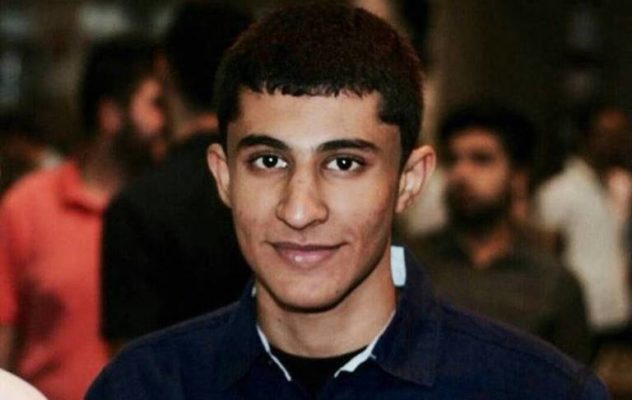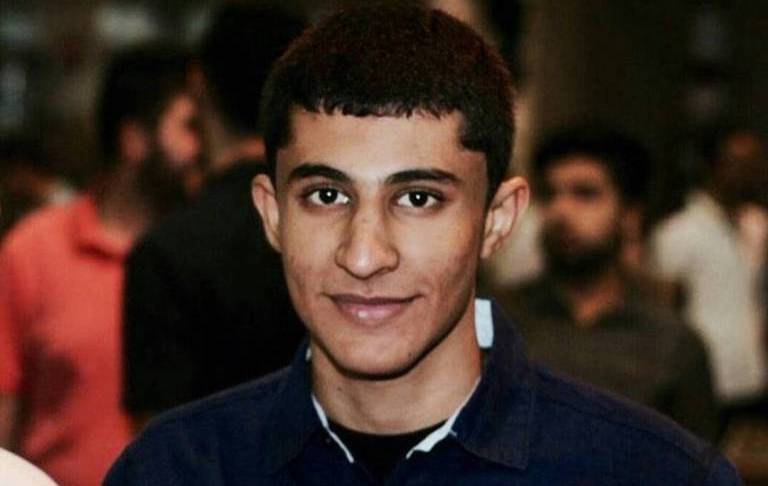 Husain Ali Mohamed is a young man from the Bahraini village of Karbabad who was in his second year of university when he was detained on 24 April 2016. He was tortured into giving a confession under detention and then sentenced to death.
Husain Ali Mohamed is a young man from the Bahraini village of Karbabad who was in his second year of university when he was detained on 24 April 2016. He was tortured into giving a confession under detention and then sentenced to death.
Husain was seized along with his friend Sayed Ahmed al-Abbar by unidentified security agents acting without a warrant. It is suspected but not confirmed that the detaining officers were from the National Security Agency. In the alternative, the forces would have been from one or another agency under the Ministry of Interior, which controls all security forces not belonging to the NSA.
Following his apprehension, Husain was transferred to the Criminal Investigations Directorate (CID), an agency of the Ministry of Interior and the most frequent perpetrator of torture in Bahrain. He was held by the CID for two weeks, during which the only contact with the outside world allowed to him was two brief phone calls to his family. Throughout these two weeks he was tortured under interrogation by beatings which broke his nose. The CID interrogators eventually obtained the coerced confession they sought, and Husain was brought to trial. The broken nose sustained under torture would have required surgery to repair, but as of the last information ADHRB had received on the case in June of this year, Husain had not been seen by a surgeon. Jail authorities twice cancelled his promised hospital appointments without explanation. Husain’s parents and attorney sought redress with Bahrain’s supposed reform and monitoring institutions (the Ministry of Interior Ombudsman and the Special Investigation Unit) but with no effect.
Husain was charged with “unlawful assembly” (Arabic: tajamhur), a frequent charge in Bahrain which is incompatible with the right to freedom of assembly under Article 21 of the International Covenant on Civil and Political Rights, to which Bahrain is party. As is typical, Bahraini authorities coupled the rights-violative charge with allegations of acts of violence, which would be crimes if proven in a fair trial. Given that the evidence in Husain’s trial was tainted by torture, however, the legal presumption of innocence must stand.
Instead, Judge Ali Khalifa al-Dhahrani, whose history of presiding over unfair trials dates back at least to 2011, sentenced Husain and al-Abbar to death. Though the trial was fundamentally compromised by the use of torture to obtain confessions, other irregularities are also worth noting. The major incident alleged is a Molotov cocktail attack on a police vehicle, said to have burned an officer to death. In the prosecution file examined by ADHRB, however, the only photos of individuals identified as the victims show two officers holding up their right hands, which are bandaged. State investigators also compelled al-Abbar to “re-enact” their theory of events while a prosecution team photographed his stage-managed performance. DT News Network, an English-language online news outlet affiliated with the government of Bahrain, reports that “Terror Crimes Prosecution Head Advocate General Ahmed Al Hammadi” stated that the case was “based on testimonies from the witnesses, the confessions of the defendants, as well as a video clip of the crime.” Photos in the prosecution file do show a police vehicle gutted by flames, but no perpetrators are in sight. Assuming this is the extent of the video evidence, it seems probable that nothing links Husain to the crime save for the tainted “confessions.”
Torture is outlawed under the international legal system, including the Convention Against Torture and the International Covenant on Civil and Political Rights, which Bahrain has joined. Unfair trial relying on coerced testimony breaches core guarantees of international law. ADHRB reiterates its call for international pressure to bring an end to the commonplace use of such practices within Bahrain, and to release those like Husain whose convictions are the product of such abuses.





